LESS ALCO: A PROCESS FOR DEALCOHOLIZING WINE
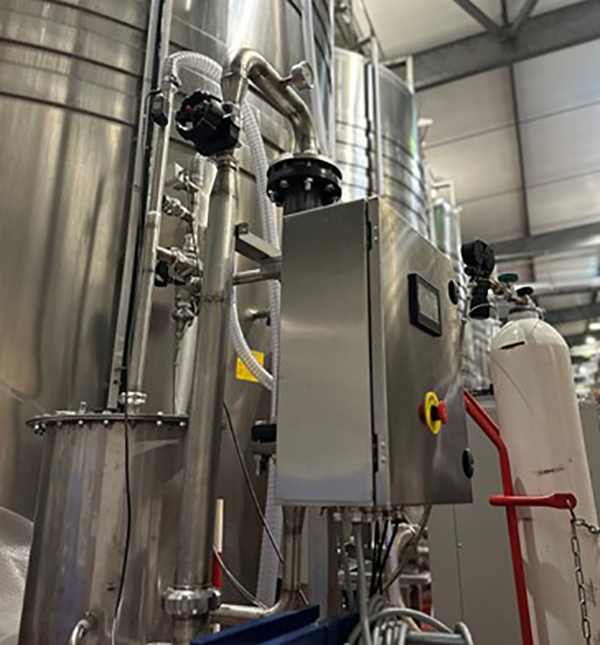
With global warming, higher temperatures mean higher alcohol levels in wines. Grapes, richer in sugar at harvest time, produce higher-alcohol wines. This affects wine quality, which no longer meets consumer expectations.
To meet this challenge, W Platform has developed the LESS ALCO solution. Supported by the Inno'Vin cluster, this project aims to develop a process for reducing the alcohol content of wines by a few degrees during the fermentation phase.
Echos de Bordeaux talks about it in its article "Projet collaboratif Lessalco": "Initially, a technical feasibility study was carried out in the laboratory and under semi-industrial conditions, using CO2 stripping. This study made it possible to validate the benefits of the imagined process, to predefine operating parameters to optimize the process, and to quantify the impact on aromatic complexity wines produced at the end of fermentation, by analyzing the wines and the water/alcohol mixture obtained.
Jean-Philippe Ricard, co-founder of W Platform, states: "Inno'vin helped launch the project by validating the technical interest and facilitating the obtaining of subsidies from BPI France and the Nouvelle Aquitaine Region. Inno'vin also enabled us to identify expert professors in this field within the Institut des Sciences de la Vigne et du Vin, which in turn enabled us to call on an intern to carry out the first laboratory tests, supervised by Rémy Ghidossi, as well as a student to write a thesis on the project.""
In a second phase, in 2023, the company entered a development phase with the demonstration of the process in real-life conditions and the development of a working prototype.
During the third phase, from 2024 to 2025, the system will be fine-tuned with a pre-production run and several real-life tests to adjust usage protocols to guarantee a reduction of 0.5 to 2 degrees of alcohol while preserving aromas and with very low energy consumption."
The stripping method using CO2 to reduce the alcohol content of wine is an innovative process that preserves the organoleptic qualities of wine. The technique begins with the injection of carbon dioxide into the wine. The gaseous CO2 forms bubbles that circulate through the liquid. Because of ethanol's volatile properties, the CO2 bubbles attract and capture the alcohol present in the wine.
As the CO2 bubbles rise to the surface, they carry alcohol molecules with them, allowing them to be extracted from the wine without the need for a temperature rise. This low-temperature method is crucial to preserving the wine's delicate aromas and unique flavors, avoiding the organoleptic alterations that other dealcoholization methods can cause.
The alcohol-laden CO2 is then separated from the wine in a stripping column. This process is repeated until the desired alcohol content is reached. The CO2 used can be recycled and reintroduced into the system, making the method more economical and ecological.
This CO2 stripping technique is particularly advantageous for maintaining wines with the same or slightly lower alcohol content despite global warming, in response to growing consumer demand for less alcoholic beverages. It also makes it possible to comply with current legislation on alcohol content, while maintaining the quality and distinctive character of the wine. This method ensures that wines retain their distinctive character and organoleptic qualities, and enables winemakers to continue producing high-quality wines in a changing environment...
The spin-offs of this project are many and promising. The W Platform project is positioned on a global scale, and incorporates other major innovations that enable fermentative CO2 to be reused directly in wineries and vineyards. This approach is fully in line with a circular economy approach, enabling winegrowers to reduce their purchases of CO2 of fossil origin, and contributing to their CSR commitments.
The Bordeaux-based company ensures local production of its main equipment, and has enjoyed strong growth over the past 1 year. Within the next five years, the company plans to increase its workforce to around thirty.
Link to Echos de Bordeaux article: https://echos-bordeaux.com/projet-collaboratif-lessalco/
INNO'VIN talks about : https://innovin.fr/projets/lessalco/
Related articles
See all articles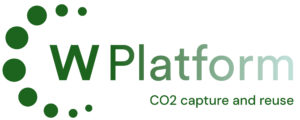
W Platform gets a makeover
At W Platform, our mission remains the same: to capture, analyze and valorize CO₂ and other gaseous effluents in a circular economy logic. Since our inception, we've grown, matured, rethought our ambitions, and felt it was time for our image to fully reflect our current vision. That's why we're proud [...]
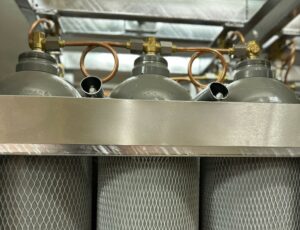
Supercritical CO₂: a technological lever for sustainable, high-performance extraction.
In a world seeking more environmentally-friendly industrial processes, the search for organic solvent substitutes is a daily quest for a large number of manufacturers. Among the emerging solutions, supercritical carbon dioxide (CO₂ SC) is establishing itself as a breakthrough technology in many fields, from cosmetics to [...]

W Platform awarded Young Innovative Company (JEI) status
We are proud to announce that W Platform was awarded official status as a Young Innovative Company (JEI) last May! This recognition marks a key stage in our development, and recognizes our team's constant efforts to place innovation and eco-design at the heart of our projects. Recognition of our commitment to innovation [...].
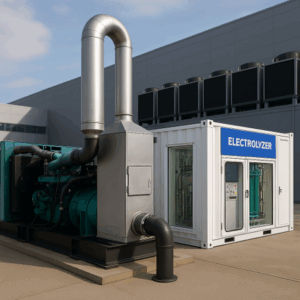
A credible alternative to 100% hydrogen for decarbonizing industrial activities
While hydrogen is often presented as the cornerstone of the energy transition, its development raises numerous technical, economic and safety challenges. A new technology, based on recycling CO₂ from combustion fumes and converting it into e-fuels like methanol, opens up a simpler, more pragmatic way of accelerating [...]
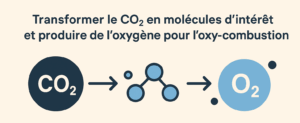
Transform CO₂ into molecules of interest and produce oxygen for oxy-fuel combustion.
Oxy-combustion is a technology that involves burning a fuel in the presence of pure oxygen, rather than using ambient air. This produces fumes containing mainly CO₂ and water vapor, making it easier to capture CO₂ for storage or recovery. However, the production of pure oxygen is energy-intensive. An alternative [...]
